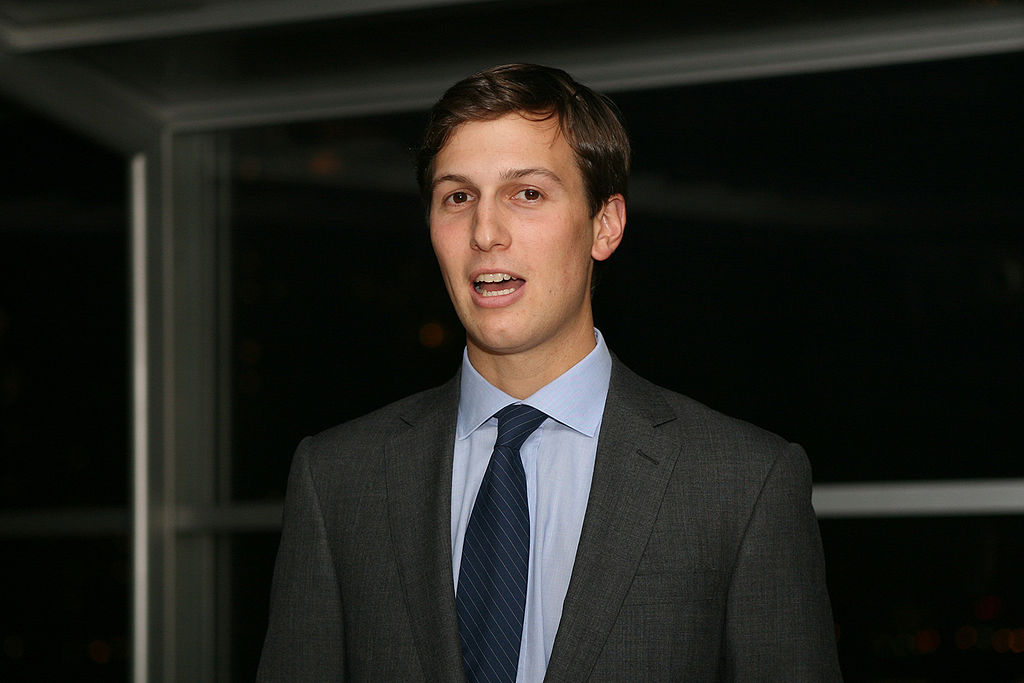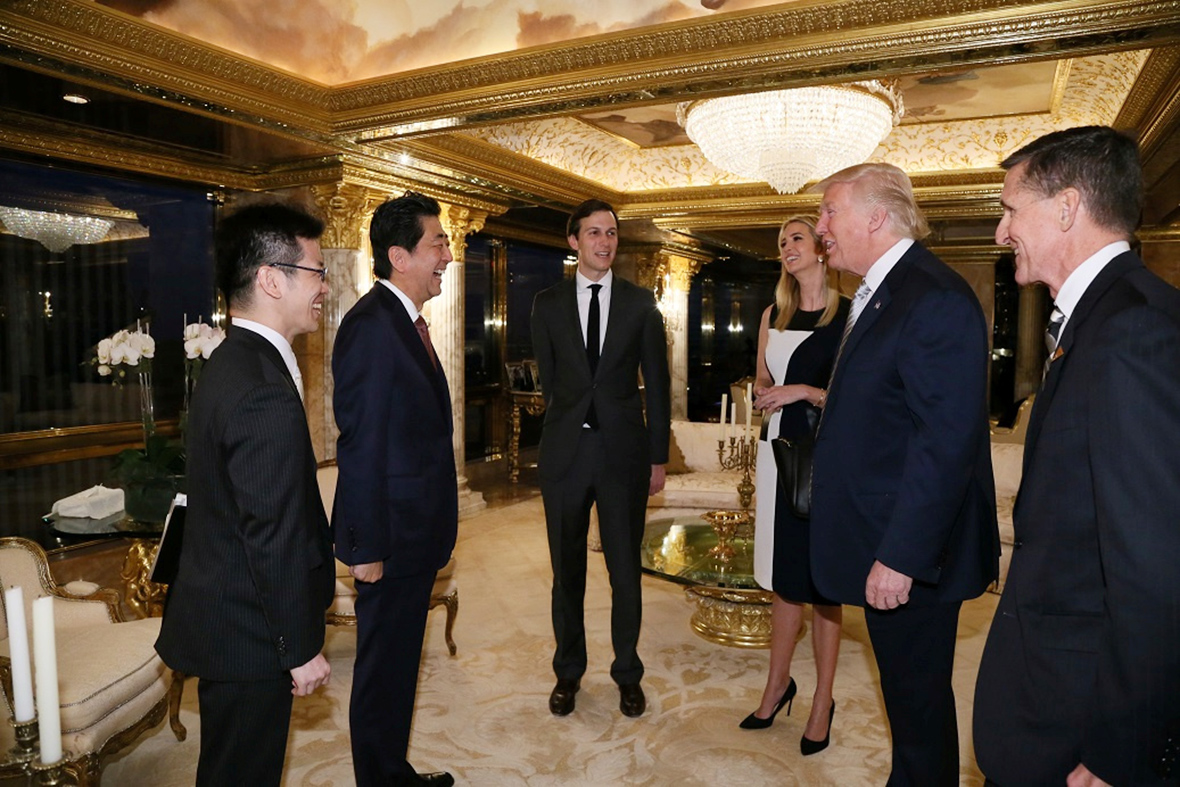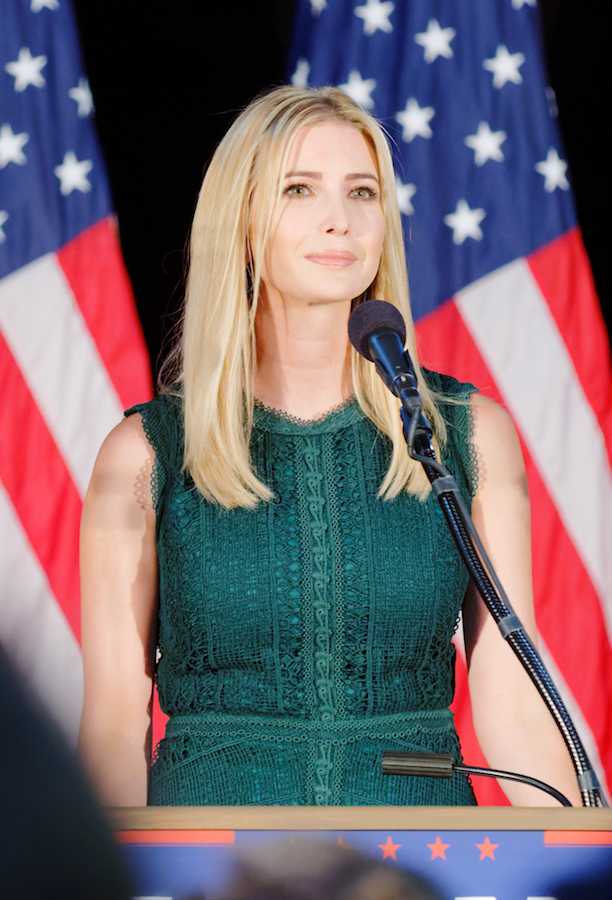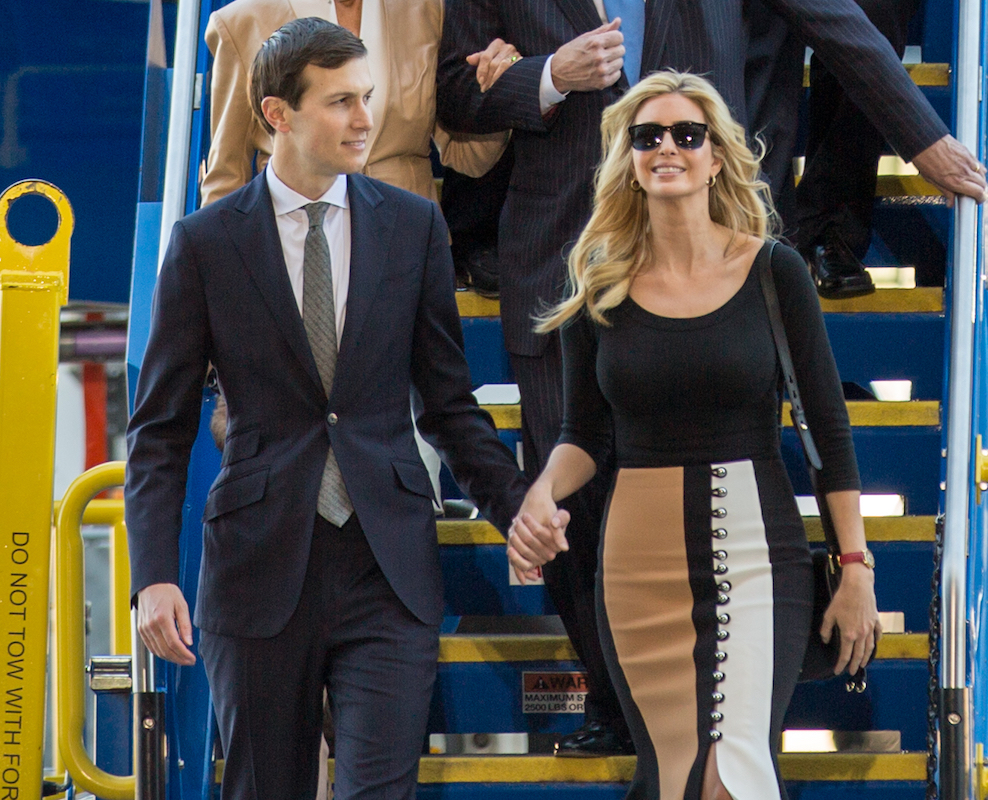by Garrett Dee
語言:
English
Photo Credit: Ryan Johnson/CC
IT CAME TO light this past week that three Chinese labor rights activists who had been investigating three separate factories in southern China had been detained by the Chinese government, their whereabouts currently unknown. The men—Hua Haifeng, Li Zhao, and Su Heng—had been investigating labor conditions at a factory in Huajian for China Labor Watch when their operation was interrupted by local police, after which the men went missing and are presumed to have been detained. The suspected cause of the arrest? The factory the men were investigating accounts for one-third of the output for Ivanka Trump’s shoe brand.
This is not the first time that Chinese factories producing products for the Trump brand have come under investigation for labor violations. Previous reports had backed up the claims that workers at factories that produce products for Ivanka Trump’s brand were working more than 40 hours of overtime per week and making less than minimum wage. Additionally, workers at these factories were also reported to have been given only five days of leave per year and working conditions at these factories have been deemed dangerous for workers’ health. This is all while Mrs. Trump claims to be advocating with her father for for labor law reforms within the United Statese, particularly those affecting working mothers. The inspections at her brand’s factories in China, however, seem to paint a different picture.
Chinese Influence Growing in the West Wing
IT APPEARS THAT the Chinese government has been stepping up its own efforts to win influence in Washington through back channels, and in particular, by actions that will flatter the Trump family directly so as to gain access to the White House. Though Beijing may have been slighted by the phone call conducted between then-president-elect Donald Trump and Taiwanese president Tsai Ing-wen shortly after the former’s election, it was reportedly the close relationship that the Chinese ambassador to Washington Cui Tiankai had been cultivating with Trump son-in-law and senior advisor to the president Jared Kushner that eased tensions and paved the way for the subsequent Trump-Xi summit that occurred at Trump’s Mar-a-Lago estate. Indeed, it was reported that Kushner himself had worked with the Chinese delegation beforehand to draft a release for that summit, suggesting that Kushner had played a central role in negotiating the substance of the meeting with the Chinese in advance.
The president himself is a man who is seemingly easily persuaded by flattery and personal displays of good intention rather than binding framework that sets up a strongly legalistic international system, thereby exposing himself and the US government to manipulation and coercion by foreign powers. That he abruptly switched course on his China policy after meeting with Chinese president Xi Jinping personally, having gone from calling the country a “currency manipulator” to praising “strong leader” Xi’s policy on North Korea, shows just how mercurial Trump can be when it comes his own personal impressions of the issues that the United States faces. Reports even have it that the president now attempts to routinely contact Xi directly in order to consult his advice on how to handle issues related to the bilateral relationship, including statements that Trump intends to consult with China on possible future contacts with Taiwan.
Trump’s connections with China run much deeper than just his official capacity as president of the United States. The Trump Organization has long sought to acquire trademarks within China, several of which have been approved by the Chinese government in this time since his term began. Trump himself has at least 89 trademarks registered in China with 28 others having won preliminary approval; his daughter has 17 registered trademarks with six that have won preliminary approval. It was already revealed during the campaign, for example, that much of the Trump menswear line is, in fact, produced in China. Additionally, unlike almost all of his predecessors, Trump and his administration have remained conspicuously silent on the issue of human rights in China, having focused almost exclusively on issues of trade and investment and avoiding outright criticism of the Chinese government in the months since his meeting with Xi.
Consolidation of Power Within the First Family
ALL OF THIS points to the notion that the members of the Trump family are operating within the United States government in the same manner as if they were still running the executive leadership of their own company. As non-elected officials with private business interests, the influence that Ivanka Trump, her siblings, and her husband Jared Kushner wield in their dealings with foreign entities is a sign of serious corruption. Indeed, it seems that from the perspective of many foreign governments, it is hard to see where the Trump brand ends and the US federal government begins.
 Jared Kushner. Photo credit: Lori Berkowitz/CC
Jared Kushner. Photo credit: Lori Berkowitz/CC
Take for instance the recent presidential foreign trip to the Middle East and Europe, in which Mr. Kushner was reported to have laid the groundwork beforehand by arranging a $110 billion weapons sales to the Saudi government that included advanced radar systems and military hardware. Reportedly, when the Saudi officials balked at the high price of the equipment, Mr. Kushner promptly picked up the phone and personally called the CEO of Lockheed Martin Marillyn Hewson and asked if she could lower the price, to which she reportedly agreed.
This is not the first time that the president has handed over the responsibility of negotiating with foreign governments to this children, or has put them on central display as de facto ambassadors of the US government and, therefore, a direct line to the president himself. The questionable role that the Trump children have been playing within US foreign policy has been an issue since the beginning of the administration, going back to photos of Ivanka Trump and Jared Kushner sitting in on the then president-elect’s meeting with Japanese Prime Minister Shinzo Abe in the Trump Tower. It was at the time believed, and even stated by Trump himself, that the Trump children would not be receiving security clearance, nor would they be taking on an active role in the administration. This statement has since been rescinded, as both Ivanka Trump and Kushner have been given security clearance and positions within the White House. Kushner’s position, director of the Office of American Innovation, was created specifically for him. The pair has since been dispatched in their position to various parts of the globe as representatives of the Trump administration, Ivanka Trump having had high profile meetings with European dignitaries as IMF leader Christine Lagarde and German Chancellor Angela Merkel, and Kushner having been sent to conflicts zones in the Middle East to personally handle diplomatic developments.
These ethics violations go far beyond promoting one’s own brand on the tax payer’s dime or attempting to use government influence to reap private profit, though the Trumps have certainly done this during their time in power. The United States foreign affairs apparatus is a multi-agency entity staffed with seasoned professionals and beholden to a system of government oversight and checks and balances. It is designed this way to prevent exactly the kind of collusion with foreign governments and foreign non-governmental entities that has plagued the Trump administration since its inauguration.
 Meeting between Donald Trump and Japanese prime minister Shinzo Abe in which Ivanka Trump and Jared Kushner were present. Photo credit: Cabinet Public Relations Office
Meeting between Donald Trump and Japanese prime minister Shinzo Abe in which Ivanka Trump and Jared Kushner were present. Photo credit: Cabinet Public Relations Office
The Trump family members, including Mr. Kushner, have flagrantly superseded this structure by having private dealings with foreign entities while at the same time showing unwillingness to fully let go of their own business interests or turn them over to blind trusts. Kushner’s family business, for example, held an event for wealthy Chinese investors in Beijing, promising them US investor visas under old immigration rules if they acted quickly to invest US$500,000 into the Kushner family’s real estate projects. Though Kushner has relinquished his stake within the company on paper, the event was billed as being directly related to him, with the host, his sister Nicole Kushner Meyer, making no secret of their relationship to the investors. It has since been revealed that the Kushner family entered into negotiations with the Chinese-owned Anbang Insurance Group over real estate development, and that the Kushners are now seeking aid to pay off their $250 million debt to Chinese investors to pay off their development of the luxury building Trump Bay Street, $50 million of which was financed through the EB-5 visa program to Chinese investors.
Nepotism Becoming the Norm
FOR THE CHINESE government in Beijing, this is the kind of governmental structure with which they are familiar, and one which serves their own interests immensely. The US-Chinese relationship suffered from a deep gridlock of suspicion during the Obama administration, with the “Rebalance Towards Asia” conducted by the United States seen as little more than a way to solidify US power within the region and simultaneously contain Beijing. Distrustful of the US foreign policy structure which seems perpetually aimed at suppressing their growing influence, a more informal pathway to the US government which bypasses formal bureaucratic structure and makes use of personal favors and backchannel negotiations to directly influence US policymaking.
In fact, the Chinese Communist Party itself has a history of elevating the children of prominent revolutionaries and officials to high positions of power that dates all the way back to the Maoist era. The current leadership of the Chinese government includes many of these so-called “Red Princelings”, children and grandchildren of those with close ties to the period of the Communist revolution and the establishment of the PRC, including Xi himself, whose father Xi Zhongxun served as Secretary General of the State Council and Head of the CPC Propaganda Department under Mao. Within the Chinese government, the term “Red Princeling” is often used as a pejorative, indicating someone who has unfairly benefitted from nepotism within the Party based on their parentage. Many of the members of this group have amassed large amounts of money and power as a result of their familial status within the Party, and scandals involving their own children’s wanton and hedonistic lifestyles often appear in the media, such as in the case of Bo Guagua, the son of disgraced Chinese official Bo Xilai, himself a member of the so-called “Red Princelings”.
 Ivanka Trump. Photo credit: Michael Vadon/CC
Ivanka Trump. Photo credit: Michael Vadon/CC
Chinese Labor Watch founder Li Qiang remarked that it is unprecedented for the Chinese government to take this sort of action against those investigating labor rule violations in factories in China. The fact that these factories have a direct connection to a member of the Trump family and therefore to President Trump himself seems to point to Beijing wanting to shield these particular factories from inspection, lest the media get any hint of something that might potentially embarrass the US president. This strategy seems to have at least partially backfired, as the detainment of the investigators itself has led to the media more closely scrutinizing the case, though press coverage on the issue within the United States itself admittedly seems to be quite low.
It is unlikely that members of the Trump family themselves are directly involved with the detainment of these investigators. Rather, what seems more likely is that this is an orchestrated move on the part of the Chinese government to protect what represents for them a highly strategic relationship.While the US State Department has reportedly released a statement calling on the Chinese government to release the labor activists involved in this case, there has been no word on the matter from either the Trump administration itself or Ivanka Trump’s company. This seems unsurprising, as it is believed by many observers that the State Department has been all but exiled from the foreign policy apparatus of the Trump administration, with Trump himself, his family members, and his advisors filling this role while many key diplomatic positions at the State Department remain unfilled, including the position for Assistant Secretary of State for East Asian and Pacific Affairs.
A Dangerously Dynastic Rule
TRUMP HAS recently displayed a complete willingness to alienate previously unquestionable allies in Europe and radically shift the direction of American foreign policy. This leaves an opening for the Chinese government, who is on the verge of launching its “One Belt, One Road” initiative to take advantage of the corruption and pay-for-play within the Trump administration and exploit the leadership vacuum left by the weakness of US global leadership.
 Jared Kushner (left) and Ivanka Trump (right). Photo credit: Ryan Johnson/CC
Jared Kushner (left) and Ivanka Trump (right). Photo credit: Ryan Johnson/CC
The operating view of the Trump administration internationally seems to be that Trump is highly transactional and extremely susceptible to personal flattery when it comes to making decision. For the Chinese and other foreign governments seeking to take advantage of the relinquishment of American leadership, keeping Trump satisfied by feeding him and his family favorable deals and trademark awards keeps him looking the other way while they pursue their own interests in the world. In this way, the American government has come to resemble more closely a third-rate authoritarian state than a global superpower, and has ceded much of the United States’ leadership to other major powers, including China and Russia.
American First Lady Melania Trump may have let slip the intentions of the Trump family when she remarked during a February suit against Mail Media for defamation that allegations made against her may have hurt her “unique, once in a lifetime opportunity” to “launch a broad-based commercial brand” as first lady. The Trump family seems to have set up their brand within the White House and wittingly used the powers of the presidency to expand their own private business interests as well as curry favor with overseas partners outside of the channels of the US diplomatic apparatus. In doing so, they have breached the ethics of the presidential office and exposed themselves and the United States to manipulation by foreign governments.

